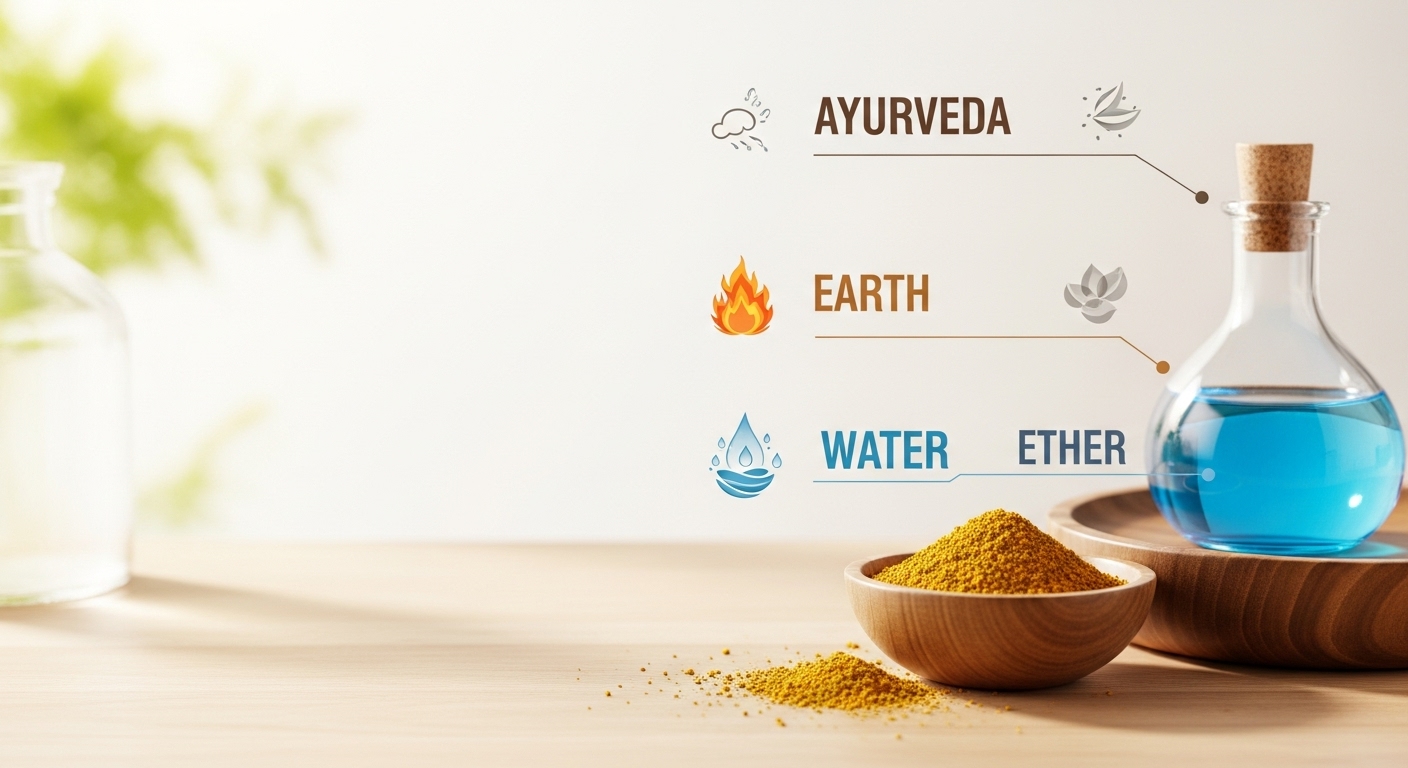
Understanding Your Dosha A Complete Guide to Ayurvedic Body Types
Byashfaq1
- On
- InUncategorized
Introduction
Have you ever wondered why your friend thrives on raw salads while they leave you feeling bloated and cold? Or why some people naturally wake up energized at 5 AM while others are night owls? The answer lies in your dosha – your unique Ayurvedic body type.
Understanding your dosha is like having a personalized instruction manual for your body. It explains your physical characteristics, emotional tendencies, digestive patterns, and even your sleep preferences. More importantly, it provides a roadmap for maintaining optimal health through diet, lifestyle, and herbal support tailored specifically to you.
In this comprehensive guide, we’ll explore the three doshas – Vata, Pitta, and Kapha – and help you discover which one (or combination) dominates your constitution. By the end, you’ll understand why Ayurveda has stood the test of time as a truly personalized approach to wellness.
What Are Doshas? The Foundation of Ayurveda
In Ayurveda, doshas are the three fundamental energies or principles that govern all biological, psychological, and physiological functions in our body and mind. The word “dosha” literally means “that which can go out of balance.”
The three doshas are:
1. Vata (Air + Space) – The energy of movement
2. Pitta (Fire + Water) – The energy of transformation
3. Kapha (Earth + Water) – The energy of structure and stability
Every person is born with a unique combination of these three doshas, called their Prakriti (nature or constitution). While we all have all three doshas, usually one or two are predominant. This natural balance is your baseline – your optimal state of health.
Why This Matters:
When your doshas are in balance, you experience:
- Strong digestion and immunity
- Mental clarity and emotional stability
- Restful sleep and abundant energy
- Healthy skin, hair, and nails
- Overall sense of well-being
When doshas become imbalanced (called Vikriti), you may experience:
- Digestive issues
- Sleep problems
- Mood swings or anxiety
- Skin conditions
- Low energy or chronic fatigue
The goal of Ayurveda is to maintain your natural doshic balance through personalized diet, lifestyle, and herbal support.
Vata Dosha: The Energy of Movement
Elemental Composition: Air + Space
Qualities: Dry, light, cold, rough, subtle, mobile, clear
Governs: Movement, circulation, breathing, elimination, nervous system
Physical Characteristics of Vata Types
Vata-dominant individuals typically have:
- Body Frame: Thin, lean, small-boned; may find it difficult to gain weight
- Skin: Dry, rough, cool to touch; prone to dryness and cracking
- Hair: Dry, frizzy, coarse; prone to split ends
- Eyes: Small, active, dry; may have dark circles
- Joints: Prominent, may crack easily
- Appetite: Variable and irregular; may forget to eat
- Digestion: Irregular; prone to gas, bloating, constipation
- Sleep: Light sleeper; difficulty falling asleep; interrupted sleep
- Body Temperature: Tends to feel cold; cold hands and feet
Mental & Emotional Traits
When Balanced:
- Creative and imaginative
- Quick learner with excellent short-term memory
- Enthusiastic and lively
- Flexible and adaptable
- Spiritual and intuitive
When Imbalanced:
- Anxious and worried
- Restless and scattered
- Overwhelmed easily
- Fearful and insecure
- Difficulty focusing or completing tasks
Common Vata Imbalances
- Anxiety and nervousness
- Insomnia or disturbed sleep
- Constipation and gas
- Dry skin and hair
- Joint pain and stiffness
- Irregular digestion
- Restlessness and difficulty relaxing
Balancing Vata Dosha
Dietary Guidelines:
- Favor warm, cooked, moist foods
- Include healthy fats (ghee, olive oil, nuts)
- Sweet, sour, and salty tastes
- Regular meal times (critical for Vata)
- Avoid raw, cold, dry foods
- Minimize caffeine and stimulants
Best Foods: Warm soups, stews, cooked grains (rice, oats), sweet potatoes, avocados, dates, almonds, warm milk
Lifestyle Recommendations:
- Establish regular routines (wake, sleep, meal times)
- Stay warm and avoid cold, windy weather
- Practice grounding activities (gentle yoga, walking in nature)
- Massage with warm sesame oil (Abhyanga)
- Create a calm, peaceful environment
- Adequate rest and sleep (8-9 hours)
Recommended Herbs:
- Ashwagandha (stress and anxiety)
- Triphala (digestion and elimination)
- Brahmi (mental calm and focus)
- Shatavari (nourishment and grounding)
Pitta Dosha: The Energy of Transformation
Elemental Composition: Fire + Water
Qualities: Hot, sharp, light, liquid, spreading, oily
Governs: Digestion, metabolism, body temperature, intelligence, vision
Physical Characteristics of Pitta Types
Pitta-dominant individuals typically have:
- Body Frame: Medium build; well-proportioned; gains and loses weight easily
- Skin: Warm, soft, fair or reddish; prone to rashes, acne, inflammation
- Hair: Fine, straight, oily; premature graying or hair loss
- Eyes: Sharp, penetrating; sensitive to light
- Appetite: Strong, regular; gets “hangry” if meals delayed
- Digestion: Strong and efficient; can handle most foods
- Sleep: Moderate; sleeps soundly but may wake feeling hot
- Body Temperature: Runs warm; dislikes heat; perspires easily
Mental & Emotional Traits
When Balanced:
- Intelligent and sharp-minded
- Natural leaders and decision-makers
- Focused and goal-oriented
- Confident and courageous
- Excellent digestion and strong metabolism
- Good public speakers
When Imbalanced:
- Irritable and impatient
- Critical and judgmental (of self and others)
- Perfectionist tendencies
- Angry and aggressive
- Competitive to a fault
- Controlling
Common Pitta Imbalances
- Acid reflux and heartburn
- Inflammatory skin conditions (acne, rashes, eczema)
- Loose stools or diarrhea
- Excessive sweating and body odor
- Anger, frustration, irritability
- Perfectionism and burnout
- Sensitivity to heat
Balancing Pitta Dosha
Dietary Guidelines:
- Favor cool, refreshing foods
- Sweet, bitter, and astringent tastes
- Avoid spicy, salty, sour, and fried foods
- Eat at regular times (don’t skip meals!)
- Moderate protein intake
- Plenty of fresh fruits and vegetables
Best Foods: Coconut, cucumber, melons, leafy greens, basmati rice, cilantro, mint, sweet fruits, ghee (in moderation)
Lifestyle Recommendations:
- Avoid excessive heat (weather, exercise, sauna)
- Take time to relax and “cool down”
- Practice moderation in all things
- Spend time in nature, especially near water
- Avoid competitive activities when stressed
- Cooling practices (moonlight walks, swimming)
- Cultivate patience and compassion
Recommended Herbs:
- Turmeric (cooling anti-inflammatory)
- Amla (digestive support, cooling)
- Brahmi (mental calm)
- Neem (blood purification, skin health)
- Aloe vera (cooling and soothing)
